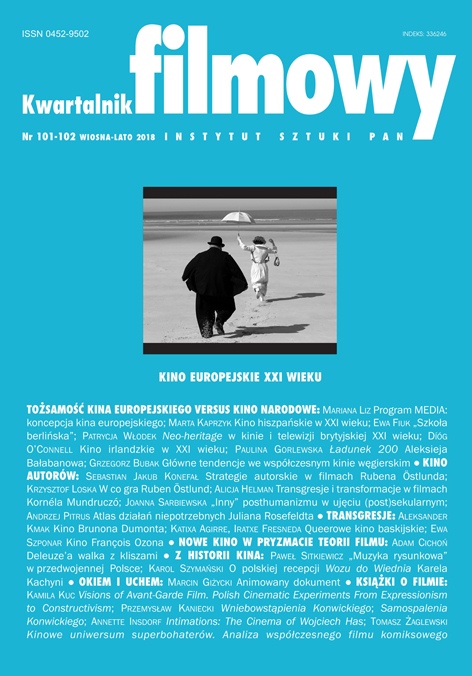O potworach i trupach, czyli symptomy rozkładu postsowieckiej Rosji w „Ładunku 200” Aleksieja Bałabanowa
About the Monsters And Corpses, Or On the Symptoms of Decay of Post-Soviet Russia In the “Cargo 200” by Aleksei Balabanov
Author(s): Paulina GorlewskaSubject(s): Fine Arts / Performing Arts, Visual Arts, Film / Cinema / Cinematography
Published by: Instytut Sztuki Polskiej Akademii Nauk
Keywords: Balabanov Aleksei;Russian cinema;
Summary/Abstract: The article is an analysis of the film “Cargo 200” (“Gruz 200”, dir. Aleksei Balabanov, 2007) in the context of post-memory of a traumatic Soviet experience. The background for the interpretation is the state of Russian-post-Soviet identity, dependent on selective amnesia combined with nostalgia, which relate to Brezhnev’s stagnation and the last years of the USSR’s existence. The Soviet past is understood here as a historical horizon and cultural heritage. The main tools of the analysis are theories of communication and cultural memory – the director, in order to talk about traumas that cannot be expressed in his own words, used narratives functioning in Russian culture: literary texts (authored by William Faulkner and Fyodor Dostoevsky) and film. In his vision, which was repeated in a series of films produced in the first and second decade of the 21st century, violence became the main code of social behaviour and the foundation that connects the community.
Journal: Kwartalnik Filmowy
- Issue Year: 2018
- Issue No: 101-102
- Page Range: 103-130
- Page Count: 28
- Language: Polish

